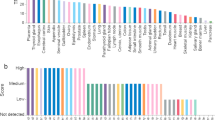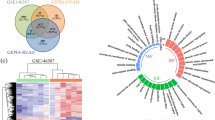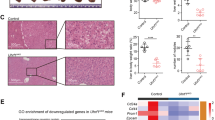Abstract
Peroxisome proliferator-activated receptor gamma (PPARG) inactivation has been identified as an important step in colorectal cancer (CRC) progression, although the events involved have been partially clarified. UHRF1 is emerging as a cofactor that coordinates the epigenetic silencing of tumor suppressor genes, but its role in CRC remains elusive. Here, we report that UHRF1 negatively regulates PPARG and is associated with a higher proliferative, clonogenic and migration potential. Consistently, UHRF1 ectopic expression induces PPARG repression through its recruitment on the PPARG promoter fostering DNA methylation and histone repressive modifications. In agreement, UHRF1 knockdown elicits PPARG re-activation, accompanied by positive histone marks and DNA demethylation, corroborating its role in PPARG silencing. UHRF1 overexpression, as well as PPARG-silencing, imparts higher growth rate and phenotypic features resembling those occurring in the epithelial-mesenchymal transition. In our series of 110 sporadic CRCs, high UHRF1-expressing tumors are characterized by an undifferentiated phenotype, higher proliferation rate and poor clinical outcome only in advanced stages III–IV. In addition, the inverse relationship with PPARG found in vitro is detected in vivo and UHRF1 prognostic significance appears closely related to PPARG low expression, as remarkably validated in an independent dataset. The results demonstrate that UHRF1 regulates PPARG silencing and both genes appear to be part of a complex regulatory network. These findings suggest that the relationship between UHRF1 and PPARG may have a relevant role in CRC progression.
This is a preview of subscription content, access via your institution
Access options
Subscribe to this journal
Receive 50 print issues and online access
$259.00 per year
only $5.18 per issue
Buy this article
- Purchase on Springer Link
- Instant access to full article PDF
Prices may be subject to local taxes which are calculated during checkout







Similar content being viewed by others
References
Alhosin M, Sharif T, Mousli M, Etienne-Selloum N, Fuhrmann G, Schini-Kerth VB et al. (2011). Down-regulation of UHRF1, associated with re-expression of tumor suppressor genes, is a common feature of natural compounds exhibiting anti-cancer properties. J Exp Clin Cancer Res 15: 30–41.
Babbio F, Pistore C, Curti L, Castiglioni I, Paolo K, Brino L et al. (2011). The SRA protein UHRF1 promotes epigenetic crosstalks and is involved in prostate cancer progression. Oncogene 31: 4878–4887.
Bostick M, Kim JK, Esteve PO, Clark A, Pradhan S, Jacobsen SE . (2007). UHRF1 plays a role in maintaining DNA methylation in mammalian cells. Science 317: 1760–1764.
Bruna A, Darken RS, Rojo F, Ocaña A, Peñuelas S, Arias A et al. (2007). High TGFb-Smad Activity Confers Poor Prognosis in Glioma Patients and Promotes Cell Proliferation Depending on the Methylationof the PDGF-B Gene. CancerCell 11: 147–160.
Burchill SA, Bradbury MF, Pittman K, Southgate J, Smith B, Selby P . (1995). Detection of epithelial cancer cells in peripheral blood by reverse transcriptase-polymerase chain reaction. Br J Cancer 71: 278–281.
Capaccio D, Ciccodicola A, Sabatino L, Casamassini A, Pancione M, Fucci A et al. (2010). A novel germline mutation in Peroxisome Proliferator-Activated Receptor γ gene associated with large intestine polyp formation and dyslipidemia. Biochim Biophys Acta 1802: 572–581.
Cheng X, Blumenthal RM . (2010). Coordinated chromatin control: structural and functional linkage of DNA and histone methylation. Biochemistry 49: 2999–3008.
Feige JN, Gelman L, Michalik L, Desvergne B, Wahli W . (2006). From molecular action to physiological outputs: Peroxisome proliferator-activated receptors are nuclear receptors at the crossroads of key cellular functions. Prog Lipid Res 45: 120–159.
Füllgrabe J, Kavanagh E, Joseph B . (2011). Histone oncomodifications. Oncogene 30: 3391–3403.
Grommes C, Landreth G, Heneka MT . (2004). Antineoplastic effects of peroxisome proliferator activated receptor γ agonists. Lancet Oncol 7: 419–429.
Hayashi K, Yokozaki H, Naka K, Yasui W, Lotan R, Tahara E . (2001). Overexpression of retinoic acid receptor β induces growth arrest and apoptosis in oral cancer cell lines. Jpn J Cancer Res 92: 42–50.
Ibrahim AE, Arends MJ, Silva AL, Wyllie AH, Greger L, Ito Y et al. (2011). Sequential DNA methylation changes are associated with DNMT3B overexpression in colorectal neoplastic progression. Gut 60: 444–508.
Issa JP . (2004). CpG island methylator phenotype in cancer. Nat Rev Cancer 4: 988–993.
Jones PA, Baylin SB . (2007). The epigenomics of cancer. Cell 128: 683–692.
Kim KJ, Esteve1 PO, Jacobsen SE, Pradhan S . (2009). UHRF1 binds G9a and participates in p21 transcriptional regulation in mammalian cells. Nucleic Acids Res 37: 493–505.
Knouff C, Auwerx J . (2004). Peroxisome proliferator-activated receptor-γ calls for activation in moderation: lessons from genetics and pharmacology. Endocrine Rev 25: 899–918.
Kondo Y, Shen L, Cheng AS, Ahmed S, Boumber Y, Charo C et al. (2008). Gene silencing in cancer by histone H3 lysine 27 trimethylation independent of promoter DNA methylation. Nat Genet 40: 741–750.
Kouzarides T . (2007). Chromatin modifications and their function. Cell 128: 693–705.
Kumar A, Xu J, Brady S, Gao H, Yu D, Reuben J et al. (2010). Tissue transglutaminase promotes drug resistance and invasion by inducing mesenchymal transition in mammary epithelial cells. PlosOne 5: e13390.
Linhart HG, Lin H, Yamada Y, Moran E, Steine EJ, Gokhale S et al. (2007). Dnmt3b promotes tumorigenesis in vivo by gene-specific de novo methylation and transcriptional silencing. Genes Dev 21: 3110–3122.
Lorenzato M, Caudroy S, Bronner C, Evrard G, Simon M, Durlach A et al. (2005). Cell cycle and/or proliferation markers: what is the best method to discriminate cervical high-grade lesions? Hum Pathol 36: 1101–1107.
McCabe MT, Brandes JC, Vertino PM . (2009). Cancer DNA methylation: molecular mechanisms and clinical implications. Clin Cancer Res 15: 3927–3937.
Meilinger D, Fellinger K . (2009). Np95 interacts with de novo DNA methyltransferases, Dnmt3a and Dnmt3b, and mediates epigenetic silencing of the viral CMV promoter in embryonic stem cells. EMBO Rep 10: 1259–1264.
Nakazawa T, Kondo T, Ma D, Niu D, Mochizuki K, Kawasaki T et al. (2011). Global histone modification of histone H3 in colorectal cancer and its precursor lesions. Hum Pathol (e-pub ahead of print 13 September 2011).
Nosho K, Shima K, Irahara N, Kure S, Baba Y, Kirkner GJ et al. (2009). DNMT3B expression might contribute to CpG island methylator phenotype in colorectal cancer. Clin Cancer Res 15: 3663–3671.
Ogino S, Shima K, Baba Y, Nosho K, Irahara N, Kure S et al. (2009). Colorectal cancer expression of PPARG (Peroxisome Proliferator-Activated Receptor-γ) is associated with good prognosis. Gastroenterology 136: 1242–1250.
Pancione M, Forte N, Fucci A, Sabatino L, Febbraro A, Di Blasi A et al. (2010a). Prognostic role of β-catenin and p53 expression in the metastatic progression of sporadic colorectal cancer. Hum Pathol 41: 867–876.
Pancione M, Sabatino L, Fucci A, Carafa V, Nebbioso A, Forte N et al. (2010b). Epigenetic silencing of Peroxisome Proliferator-Activated Receptor γ is a biomarker for colorectal cancer progression and adverse patients’ outcome. PlosOne 5: e14229.
Papait R, Pistore C, Negri D, Pecoraro D, Cantarini L, Bonapace IM . (2007). Np95 is implicated in pericentromeric heterochromatin replication and in major satellite silencing. Mol Biol Cell 18: 1098–1106.
Phe V, Cussenot O, Roupret M . (2010). Methylated genes as potential biomarkers in prostate cancer. Br J Urol Int 105: 1364–1370.
Portela A, Esteller M . (2010). Epigenetic modifications and human disease. Nat Biotechnol 28: 1057–1068.
Sabatino L, Casamassimi A, Peluso G, Barone MV, Capaccio D, Migliore C et al. (2005). A novel peroxisome proliferator-activated receptor γ isoform with dominant negative activity generated by alternative splicing. J Biol Chem 280: 26517–26525.
Sarraf P, Mueller E, Smith WM, Wright HM, Kum JB, Aaltonen LA et al. (1999). Loss-of-function mutations in PPARγ associated with human colon cancer. Mol Cell 3: 799–804.
Sharif J, Muto M, Takebayashi S, Suetake I, Iwamatsu A, Endo TA et al. (2007). The SRA protein Np95 mediates epigenetic inheritance by recruiting Dnmt1 to methylated DNA. Nature 450: 908–912.
Shen CX, Hu Lh, Li YR . (2008). Quantitative Real Time RT-PCR detection for survivin, CK20 and CEA in peripheral blood of colorectal cancer patients. JPN J Clin Oncol 38: 770–776.
Smith JJ, Deane NG, Wu F, Merchant NB, Zhang B, Jiang A et al. (2010). Experimentally derived metastasis gene expression profile predicts recurrence and death in patients with colon cancer. Gastroenterology 138: 958–968.
Tien AL, Senbanerjee S, Kulkarni A . (2011). UHRF1 depletion causes a G2/M arrest, activation of DNA damage response and apoptosis. Biochem J 435: 175–185.
Unoki M, Nishidate T, Nakamura Y . (2004). ICBP90, an E2F-1 target, recruits HDAC1 and binds to methyl-CpG through its SRA domain. Oncogene 23: 7601–7610.
Varier HT, Timmers M . (2011). Histone lysine methylation and demethylation pathways in cancer. Biochimica et Biophysica Acta 1815: 75–89.
Wang D, Dubois RN . (2008). Peroxisome proliferator-activated receptors and progression of colorectal cancer. PPAR Res 2008: 931074.
Acknowledgements
This work was supported by Associazione Italiana per la Ricerca sul Cancro (AIRC) to LA and IMB; Fondazione Cariplo ‘Progetto Nobel’ to IMB; European Union: CancerDip contract no 200620, Aposys contract no 200767 to LA; Associazione Italiana per la lotta ai linfomi e leucemie (AIL) to VC. We wish to thank Prof N Zambrano for kindly providing the shRNA vectors employed.
Author information
Authors and Affiliations
Corresponding author
Ethics declarations
Competing interests
The authors declare no conflict of interest.
Additional information
Supplementary Information accompanies the paper on the Oncogene website
Supplementary information
Rights and permissions
About this article
Cite this article
Sabatino, L., Fucci, A., Pancione, M. et al. UHRF1 coordinates peroxisome proliferator activated receptor gamma (PPARG) epigenetic silencing and mediates colorectal cancer progression. Oncogene 31, 5061–5072 (2012). https://doi.org/10.1038/onc.2012.3
Received:
Revised:
Accepted:
Published:
Issue Date:
DOI: https://doi.org/10.1038/onc.2012.3
Keywords
This article is cited by
-
Global and Regional DNA methylation silencing of PPARγ Associated with Glioblastoma Multiforme Pathogenesis
Molecular Biology Reports (2023)
-
UHRF1-KAT7-mediated regulation of TUSC3 expression via histone methylation/acetylation is critical for the proliferation of colon cancer cells
Oncogene (2020)
-
Identification of EMT-related high-risk stage II colorectal cancer and characterisation of metastasis-related genes
British Journal of Cancer (2020)
-
UHRF1 depletion and HDAC inhibition reactivate epigenetically silenced genes in colorectal cancer cells
Clinical Epigenetics (2019)
-
Activated MEK/ERK Pathway Drives Widespread and Coordinated Overexpression of UHRF1 and DNMT1 in Cancer cells
Scientific Reports (2019)



